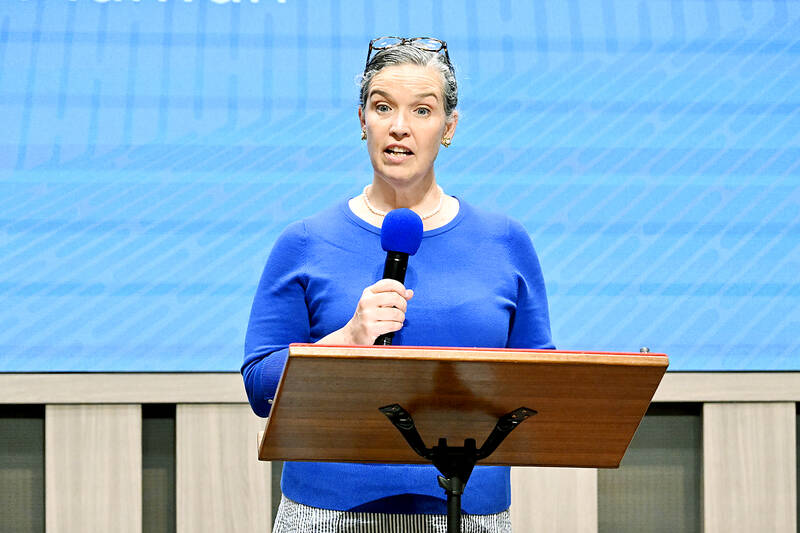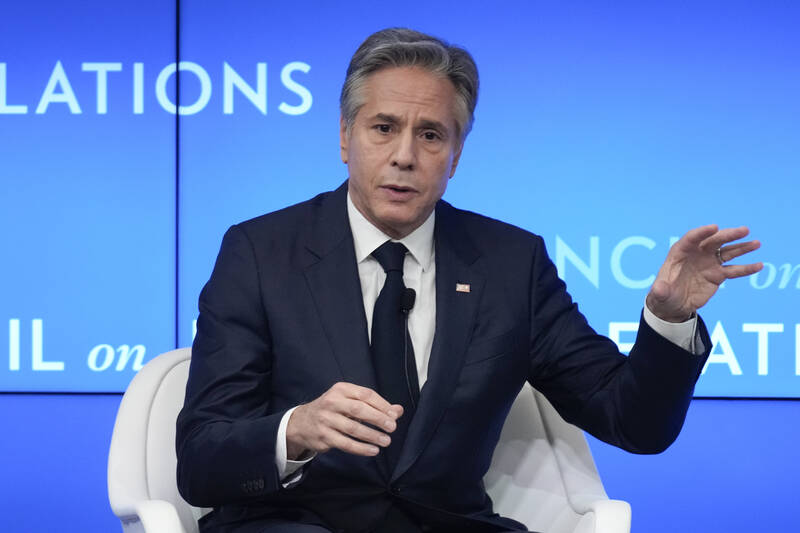The US has taken measures to build a more reliable supply chain through information security cooperation with like-minded partners such as Taiwan, American Institute in Taiwan (AIT) Director Sandra Oudkirk said yesterday.
“The Biden-Harris administration is taking key measures to prioritize and elevate cybersecurity within the United States and with our like-minded partners, including Taiwan,” Oudkirk said, referring to US President Joe Biden and US Vice President Kamala Harris.
She made the remarks at the Taiwan-US Financial Cybersecurity Summit held by the AIT and the Taiwan Academy of Banking and Finance in Taipei.

Photo: George Tsorng, Taipei Times
“Cybersecurity is a shared challenge and handling it will require a shared approach,” she said, adding that the US Department of the Treasury and Taiwan’s Financial Supervisory Commission (FSC) have been working together on the issue, and “already they have accomplished so much.”
Several Treasury officials are in Taiwan to share the US’ experiences at the summit, she said.
Oudkirk also said that the US Department of Commerce is planning a cybersecurity trade mission to Taiwan in September, during which the two sides would follow up on the discussions.

Photo: AP
As the tactics, techniques and procedures of cyberattacks are constantly evolving, “it is critical that we work together as partners to learn from each other and to bolster our critical networks,” she said.
“Here in Taiwan, I have made cybersecurity a key focus of AIT engagement. I am proud of the work we have done together so far,” she said, citing such examples as the Global Cooperation and Training Framework workshops, the Cyber Offensive and Defensive Exercise, and the US-Taiwan Technology, Trade and Investment Collaboration.
President Tsai Ing-wen (蔡英文), who addressed the summit after Oudkirk, said that she has been underlining the concept “cybersecurity is national security” since she took office.
Information security threats are inevitable challenges Taiwan has to face while promoting digital transformation, she said, adding that the identification, assessment and control of information security risks require cooperation among industries.
The government has been improving every aspect of information security protection, including by establishing the Ministry of Digital Affairs in August last year and the National Institute of Cyber Security in February, Tsai said.
It also issued new action guidelines last month to fight online fraud, she said.
The FSC in 2020 introduced the Financial Cyber Security Action Plan and updated it last year to improve resilience to information security breaches, Tsai said.
The Legislative Yuan last month passed amendments to the Banking Act (銀行法), the Securities and Exchange Act (證券交易法) and the Futures Trading Act (期貨交易法) to boost the protection of key financial infrastructure, she said.
On international cooperation, the Financial Information Sharing and Analysis Center has been working with the US since 2019 to share intelligence on information security, Tsai said.
The center joined the Forum of Incident Response and Security Teams in January last year, after which it has signed memorandums of understanding with financial security agencies in many countries, she said.
In other news, US Secretary of State Antony Blinken on Wednesday reiterated that the US continues to be guided by the “one China” policy, based on the Three Joint Communiques, the Taiwan Relations Act and the “six assurances.”
“That hasn’t changed and that won’t change,” he said during a conversation with Council on Foreign Relations president Richard Haass.
“Under the Taiwan Relations Act we’ve had a longstanding policy of making sure that we could do what’s necessary to help Taiwan defend itself,” he said.
“That policy and the sort of rheostat on it also depends a lot on what Beijing is doing or not doing, and that was designed in from the get-go, including in the communiques,” he added.
Additional reporting by staff writer

SECURITY: As China is ‘reshaping’ Hong Kong’s population, Taiwan must raise the eligibility threshold for applications from Hong Kongers, Chiu Chui-cheng said When Hong Kong and Macau citizens apply for residency in Taiwan, it would be under a new category that includes a “national security observation period,” Mainland Affairs Council (MAC) Minister Chiu Chui-cheng (邱垂正) said yesterday. President William Lai (賴清德) on March 13 announced 17 strategies to counter China’s aggression toward Taiwan, including incorporating national security considerations into the review process for residency applications from Hong Kong and Macau citizens. The situation in Hong Kong is constantly changing, Chiu said to media yesterday on the sidelines of the Taipei Technology Run hosted by the Taipei Neihu Technology Park Development Association. With

CARROT AND STICK: While unrelenting in its military threats, China attracted nearly 40,000 Taiwanese to over 400 business events last year Nearly 40,000 Taiwanese last year joined industry events in China, such as conferences and trade fairs, supported by the Chinese government, a study showed yesterday, as Beijing ramps up a charm offensive toward Taipei alongside military pressure. China has long taken a carrot-and-stick approach to Taiwan, threatening it with the prospect of military action while reaching out to those it believes are amenable to Beijing’s point of view. Taiwanese security officials are wary of what they see as Beijing’s influence campaigns to sway public opinion after Taipei and Beijing gradually resumed travel links halted by the COVID-19 pandemic, but the scale of

A US Marine Corps regiment equipped with Naval Strike Missiles (NSM) is set to participate in the upcoming Balikatan 25 exercise in the Luzon Strait, marking the system’s first-ever deployment in the Philippines. US and Philippine officials have separately confirmed that the Navy Marine Expeditionary Ship Interdiction System (NMESIS) — the mobile launch platform for the Naval Strike Missile — would take part in the joint exercise. The missiles are being deployed to “a strategic first island chain chokepoint” in the waters between Taiwan proper and the Philippines, US-based Naval News reported. “The Luzon Strait and Bashi Channel represent a critical access

Pope Francis is be laid to rest on Saturday after lying in state for three days in St Peter’s Basilica, where the faithful are expected to flock to pay their respects to history’s first Latin American pontiff. The cardinals met yesterday in the Vatican’s synod hall to chart the next steps before a conclave begins to choose Francis’ successor, as condolences poured in from around the world. According to current norms, the conclave must begin between May 5 and 10. The cardinals set the funeral for Saturday at 10am in St Peter’s Square, to be celebrated by the dean of the College